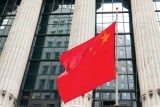Is China rising to or returning to its historical position in the world order, asks Mark Godfrey?
There’s been a lot of chest-beating in early June in Chinese official media, all of it lauding China’s development path of recent decades. The tone and volume of the usual unquestioning and unquestioned — in a country where newspapers don’t print letters to the editor or responding articles — output from government-paid researchers has been turned up a notch in the last few months.
One of those articles, published with characteristically certainty and inelegant English in the Global Times newspaper, is by Zhang Shuhua, director of the Institute of Information Studies at the Chinese Academy of Social Sciences who compared what he calls the virtues of ‘China’s road’ next to the ‘failure’ of western economics and governance. “The descent of the Western world in the global pattern is a milestone in history, which is an unprecedented change in the past 200 to 300 years. It signals that the ‘free and democratic’ road in developed Western countries has sunk into an unprecedented crisis … At the same time, China’s response and performance have been quite attractive by taking on distinct institutional advantages and governance capacity.”
Authoritarian approach
Zhang and fellow scribes aren’t allowed to state this openly but the latest barrage of self-congratulation is to justify the approach taken 25 years ago when China sent soldiers and tanks to clear Tiananmen Square of peaceful protestors. The survival of the Communist Party shows the authoritarian approach has worked because China’s economy is strong, say Chinese leaders and their cheerleaders in the state-run press.
That view also appears to be shared, or at least promoted by, private business too. At least that’s the impression you get listening to the dean of a private school teaching China’s corporate elite how to adapt international corporate practices.
Xiang Bing is founding dean and professor of business at the Cheung Kong Graduate School of Business, the Beijing school founded by Asia’ richest man Li Ka Shing, a tycoon who has done well from embracing Beijing’s ruling class. The founders and managers of many of China’s largest state and private firms attend classes at the Cheung Kong, located in Li Ka Shing’s massive Oriental Plaza, a mall near Tiananmen Square.
Political prowess
Many will argue with Xiang’s praise of China’s political system as a unique economic advantage: elite rule attracts the best talent, says Xiang. He praises the Communist Party system: “under which candidates must rise up, rank by rank, and give Chinas’ leaders essential experience at all levels”.
He doesn’t of course say the system also must tolerated and facilitated massive, unchecked corruption and incompetence in a country where elite rulers can’t be voted out.
Xiang credits the Communist revolutionary Mao Zedong with setting the country up with three big advantages: a huge population (which according to Xiang has ensured China’s economic competitiveness), literacy (through his campaign to simplify written Mandarin) and liberation of women: China is indeed more egalitarian than Japan and Xiang notes that India will have a bigger population but won’t compare in literacy rates, especially for women.
Yet, despite praising the Communist Party record, Xiang concedes China will ultimately need to fix its political system. Equally questionable is his argument that China has more experience than any other country with different political systems: it has tried communism, socialism, capitalism and both planned and market economies, says the dean. This experience will serve China well when its forced to “re-evaluate its system and make hard choices”, he says.
Status Quo
The way Xiang sees it, China is not rising as much as returning to its historical position in the world order.
In the 1820s, over 30% of the world GDP came from China, and at that time more than the GDP of the EU and US combined. It has gone from 2% in 1978 to 12% currently. There is a way to go yet to get back to where China was and that room for the country to recoup its earlier status will guarantee continued economic growth in China, suggests Xiang.
He’s right on the entrepreneurial drive of the Chinese: the emergence of mobile and e-commerce in recent years shows what private businesspeople here are capable of. But most of the economy —energy, finance, infrastructure etc — is off limits to private or multinational investors.
“China has an open mindedness about new ideas that does not exist in other countries,” says Xiang, in apparent earnestness. Yes, Chinese businesses are good at learning, soaking up imported knowledge and technologies. But there are not so many immediately apparent instances of Chinese innovation — at least not in the international market place.
Likewise, greater affluence means more emigration and more Chinese students attending the world’s top schools, Xiang claims. Perhaps, but most stay away, thanks in large part to the lack of political reform.
The truth is that both cash and entrepreneurship are flowing out of China with the country’s wealthy who increasingly seek security in a foreign passport.
Growth potential
Xiang maintains that China’s openness to FDI means it’s a ‘very open’ and globalised economy. Indeed, 2012 was the first year in a decade that firms using foreign investment contributed less than 50% of exports. That they still contribute so much is astounding.
And what happens now? Xiang claims China can continue to rev up economic growth because its urbanisation rate is 42%, whereas the US and Brazil are both at 85%. Likewise, the service sector accounts for 46% of China’s GDP in 2012 — the US got 80% of GDP from services in that period.
Economic growth in the West dictates Chinese export data and employment rates, but sales in China drive corporate results in the EU and US”
Promised further deregulation of services industries like finance, media, healthcare and telecoms can pay dividends for years: the US spends 18% of GDP on healthcare, but China is less than 6%. This entails much room for increased spending and growth. Most economists concur that economic growth here will slow from a current 7.5% and drop to 7% next year.
The pace of the slow-down however will depend on how China manages worrying debt levels. Officially, the debt to GDP level is at 60%, but that figure excludes debt taken on board by state-owned enterprises — count that in and the debt to GDP figure approaches 120%.
Time to change
Can China get rich before it gets old? With its society ageing fast China is running out of time to lift its social spending and productivity to levels approaching developed country standards. And this will be vital if Xiang’s predictions for China’s future growth are to be realised.
A quarter of a century on from the Tiananmen Square crack-down, an ever more capitalist China is more integrated into the global economy that ever. Economic growth in the West dictates Chinese export data and employment rates, but sales in China drive corporate results in the EU and US. That point seems to go over the head of Zhang Shuhua in his verbal volley in support of the Party 25 years after Tiananmen. “The mainstream Western society has long held that its competitive democracy and liberal market model are universal and perpetual and therefore the ‘happy ending’ for all humanity,” he argues. “Western theorists of democracy have contributed a lot to shaping the hegemony of democracy …”
But wasn’t it the Communist Party selective to certain embrace of the ‘liberal market model’ that allowed the Party to remain in power since 1989? It will be fascinating to see if they’re still in power and where China will be headed, 25 years from now.





